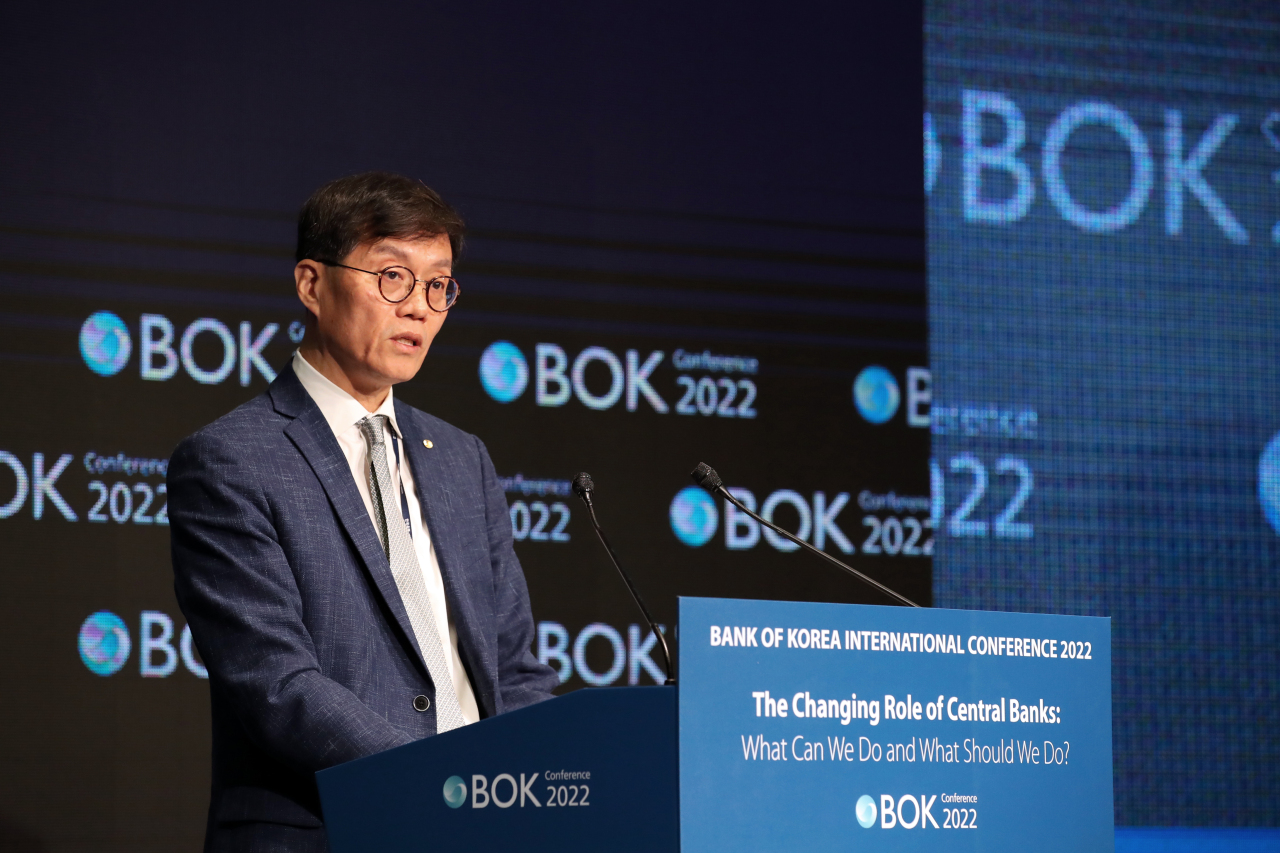Central banks should think about what they should do besides keeping prices stable as emerging economies including South Korea struggle to avert anemic growth once persistent inflation caused by the pandemic cools off, Bank of Gov. Rhee Chang-yong said Thursday at a conference.
“To escape a low growth, low inflation trap, should emerging market economies, or Korea for that matter, follow the same advice professor Paul Krugman gave to central bankers in advanced economies, to ‘credibly promise to be irresponsible?’” Rhee asked, referring to a potentially unsustainable expansionary policy.
Emerging economies, Rhee added, does not have the luxury of using huge monetary stimulus advanced economies, like the US, had relied on during the pandemic, because they would see weakening currencies, capital outflows and rising prices. Finding effective tools to prevent that is crucial, Rhee noted.
Park Sung-ho, head of the international economics team at the BOK, said central banks could issue sovereign bond-backed securities or SBBS to a greater extent than what they have so far.
This idea involves using a pool of sovereign bonds as collateral for a security delivered in tranches of different seniority, so that the most senior slice would be risk-free while the junior one is riskier. Central banks could use such ready-made “safe assets” to ensure financial stability, when needed, according to Park.
Park stressed liquidity in the SBBS market, where he said the securities should be issued in quantities large enough so banks holding senior SBBS would feel safe from sovereign debt while the government reduces the risk of an investor run, set off by fears of a supply shortage.
Political stability in the country SBBS is issued is important, Park said, describing a sound banking system backed by regulation as laying out a foundation for the long run.
Markus Brunnermeier, an economics professor at Princeton University, said the conventional ways central banks had dealt with financial instability by holding reserves and asking for support from the International Monetary Fund fall short of what could be done better.
“Tranching completes the market,” Brunnermeier said, noting pooling securities carrying different levels of risk offers a solution to investors whose risk tolerance is not identical. Emerging economies would be less vulnerable to a financial crisis involving inflation, he added.
Meanwhile, Jonathan Ostry, an economics professor at Georgetown University, said emerging economies should keep an eye on debt levels, which were worse than what the IMF forecast.
Those countries should brace for more capital outflows and volatility as the US mulls more rate hikes, Ostry added. In early May, the US Fed lifted rates by half a percentage point in its biggest hike in 22 years. It is expected to back raises taking the target range to between 2.75 percent and 3 percent by 2022.
Ostry said shipping costs had more to do with persistent inflation than commodity prices, such as oil and wheat, noting the impact from high soaring shipping costs would extend through 2023.
But the global economy was not headed to stagflation, a blend of weak growth and strong inflation, according to Shin Hyun-song, economic adviser and head of research at the Bank for International Settlements.
Shin said commodity prices weigh on growth and fuel inflation but countries have reduced their reliance on oil, a sign he says means the global economy would not revisit the 1970s-style stagflation prompted by surging oil prices. Renewable energy helped reduce dependence on the conventional energy source, according to Shin.
Gov. Rhee acknowledged that central banks have to take on new roles as they fend off unprecedented economic challenges while making a transition into a green economy, saying central bank need to adapt to a changing environment.
“We must not forget that the interpretation of central bank mandates and ways to achieve them have been constantly evolving,” Rhee said, adding that the central bank should live up to expectations from the public as well as the private sector as it begins to craft new rules for a post-pandemic world.
By Choi Si-young (
siyoungchoi@heraldcorp.com)








![[Weekender] Korea's traditional sauce culture gains global recognition](http://res.heraldm.com/phpwas/restmb_idxmake.php?idx=644&simg=/content/image/2024/11/21/20241121050153_0.jpg)